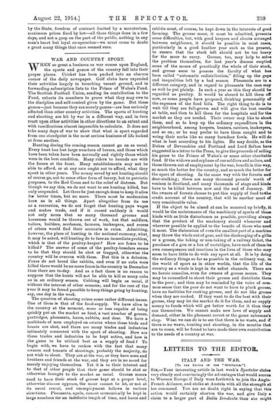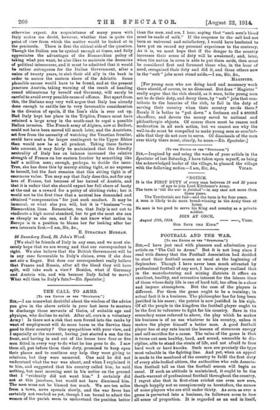LETTERS TO THE EDITOR.
ITALY AND THE WAR.
rTo Vas EVITOU or VIII "131MCIATOL") Sin,—Your interesting article in last week's Spectator states very clearly and convincingly the advantages that would accrue to Western Europe if Italy were forthwith to join the Anglo- French Alliance, and strike at Austria with all the strength at her command. You are no doubt right in saying that this action would certainly shorten the war, and give Italy a claim to a larger part of Italia Irredenta than she might
otherwise expect. An acquaintance of many years with Italy makes me doubt, however, whether that is quite the point of view from which the matter would be looked at in the peninsula. There is first the ethical side of the question. Though the Italian can be cynical enough at times, and fully appreciates the advantages of the Bismarckian policy of taking what you want, he also likes to maintain the decencies of political intercourse, and it must be admitted that it would be rather outrageous for the Italian Government, after a union of twenty years, to stab their old ally in the back in order to secure the eastern shore of the Adriatic. Some plausible excuse would have to be found, and at the present juncture Austria, taking warning of the result of banding round ultimatums by herself and Germany, will surely be careful to avoid every possible cause of offence. But apart from this, the Italians may very well argue that Italy has already done enough to entitle her to very favourable consideration in the division of spoils, if the lion's skin is ever cut up. Had Italy kept her place in the Triplice, France must have retained a large army in the south-east to repel a possible Italian invasion. The French army of Algiers, now at Belfort, could not have been moved till much later, and the Austrians, set free from the necessity of watching the Venetian frontier, could have sent a far larger contingent to the Tipper Rhine than would now be at all prudent. Taking these factors into account, it may fairly be maintained that the friendly neutrality of Italy has on balance increased the relative strength of France on her eastern frontier by something like half a million men ; enough, perhaps, to decide the issue. True, she has done this by merely sitting tight, at no expense to herself, but the fact remains that this sitting tight is of enormous value. You may say that Italy does this, not for any love of Fiance, but because of her hatred of Austria, and that it is unfair that she should expect her full share of booty at the end as a reward for a policy of shirking risks ; but it would not be the first time that a neutral has demanded and obtained "compensation" for just such conduct. It may be immoral, or what else you will, but it is " business "—on Bismarckian lines. Remember, too, that Italy is not out to vindicate a high moral standard, but to get the most she can as cheaply as she can, and I do not know what nation in Europe is in a position to blame her for looking after her awn interests first.—I am, Sir, &c., [We shall be friends of Italy in any case, and we most sin- cerely hope that we are wrong and that our correspondent is right. We also believe that the British Government will be in any case favourable to Italy's claims, even if she does not stir a finger. But does our correspondent really believe that France and Russia, after all the blood they will have spilt, will take such a view ? Besides, what if Germany and Austria win, and win because Italy failed to move ? What will then be Italy's fate P—En. Spectator.]



































 Previous page
Previous page